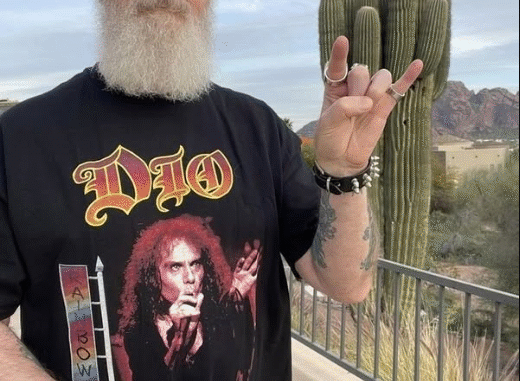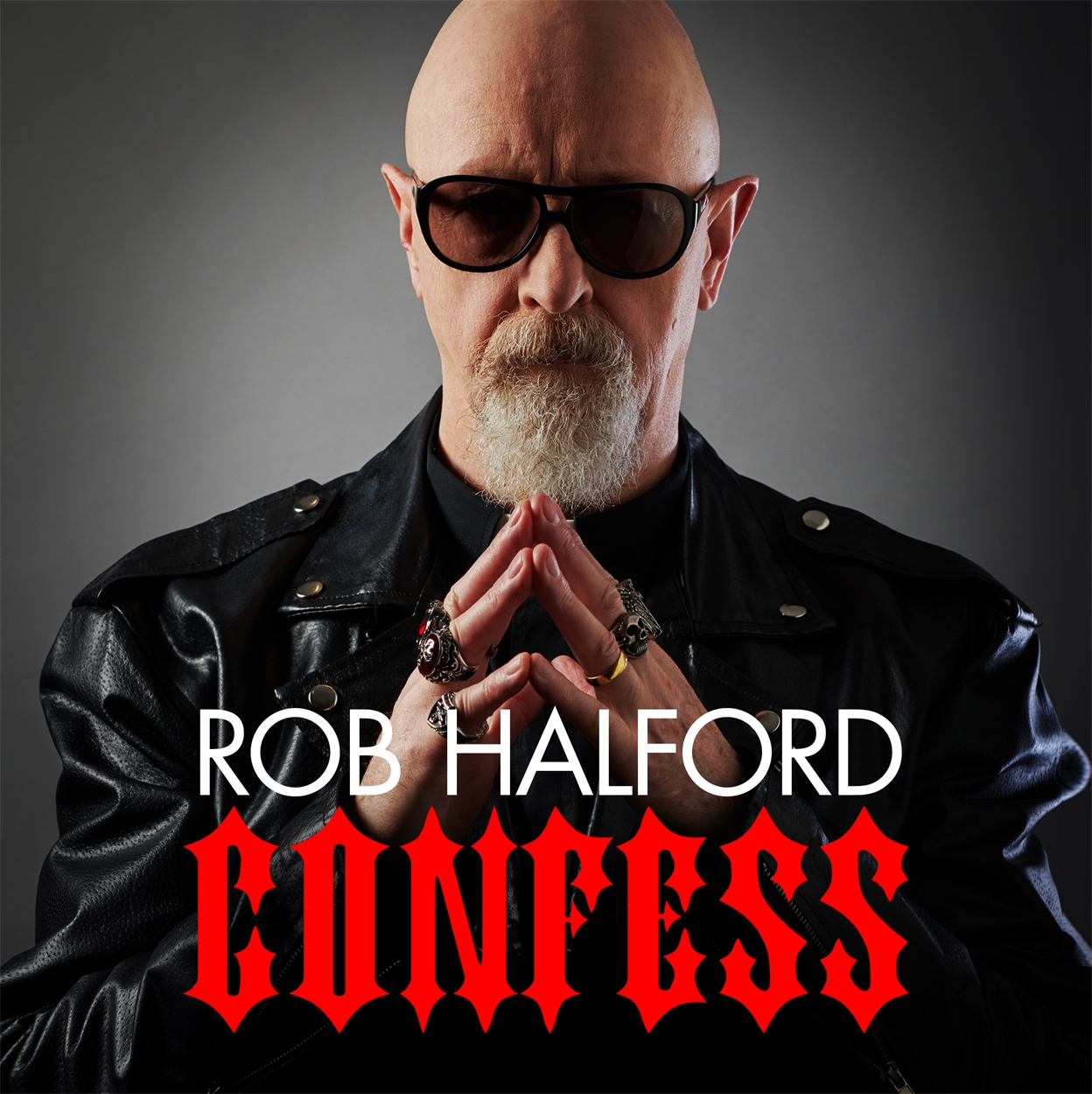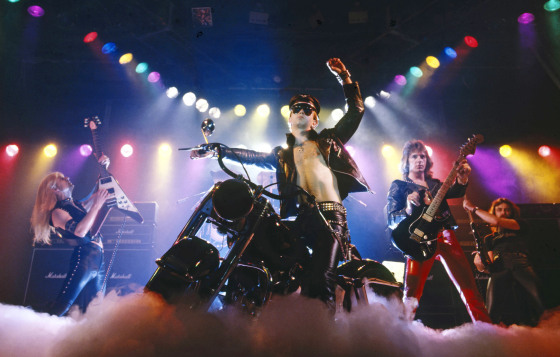
Judas Priest’s Rob Halford on public-sex arrest: ‘I’ve f–ked up!’

Judas Priest singer Rob Halford once took a law-breaking walk on the wild side that could have ended his career.
The gay, leather-loving singer reveals in his “totally candid” memoir — “Confess: The Autobiography,” out Tuesday — that California cops covered up for his long-ago arrest for “public indecency” at a Venice Beach restroom.
In a book excerpt from Rolling Stone, the heavy-metal legend also relates a tasty affair from the early 1990s, when a then-closeted Halford would head to Camp Pendleton in California for threeways with a bisexual Marine sergeant and his wife — the only woman Halford says he has ever had sex with.
“Once the door was shut, we would go at it for hours,” Halford, now 69, writes of their hookups in his new torrid tome. “I’d leave there more exhausted than if I’d been for a gym workout.” He adds that he was “far more interested” in the man and that his “heart wasn’t in it” as far as having sex with the wife, although she was “a lovely, beautiful woman, with a perfect body.”

But the self-proclaimed “metal god” also got his kicks in other more lurid places. Halford recalls taking a mountain-bike ride in early 1992 — not long before he first left the band — and swinging by “a notorious men’s washroom” in Venice Beach, where he “decided to stop off and try my luck.”
His “luck” quickly ran out: After fondling himself in an open restroom stall, Halford was arrested by an undercover cop.
“Oh, f–k! A million thoughts raced through my mind,” he writes of getting caught. “This is it! I’ve f–ked up! It’s going to be in the papers! I’ve lost everything! And yet, at the same time, I felt oddly calm.”
A handcuffed Halford was taken to a police station and, while there, an officer recognized him.
“I thought it was you,” the cop told him, and then asked, “What the hell are you doing here, Rob Halford?”
“I’m a f–king idiot,” Halford replied. The officer said he would see what he could do about the situation. While waiting, Halford writes, other officers “flashed devil horns” at him through his cell window — a recognition of his Judas Priest stature — and he “did the same back, and stuck my tongue out. It passed the time.
Halford was eventually released and the first officer who recognized him said they would keep the incident from the press. “I had been lucky. Again,” Halford writes.

“How did I feel? Stupid, and ashamed, but also angry — that, this late in the century, gay men still had to live in fear like this,” continues Halford, who publicly came out on MTV in 1998 and reunited with the band in 2003.
“I always call this [1992] arrest my ‘George Michael moment,’ after he did the same thing in Beverly Hills six years later,” he says, referring to the late Wham singer’s 1998 arrest for a lewd act in a park. “The only difference was that George wasn’t so lucky with the newspapers.”
He does, however, say he thinks Judas Priest fans might have gotten past his faux pas had it come to light at the time.
“I’d like to think for the most part if that incident had broken into the press then a great proportion of my fans would have said: ‘We’ll support you and stand with you,’” he recently told NME. “A few years later, when I came out on MTV, that was a proven fact because the feedback from around the world was positive — they just wanted me to continue being the singer for Judas Priest and get on with the job.”
In the memoir, Halford also talks about the sexual abuse he faced when he was younger by a friend of his father.
“At the time, it was terribly confusing and couldn’t have happened at a worse time, for me as a young guy that was already dealing with trying to figure things out,” he told Variety in an interview last week. “Talking about it now, I can feel the horror and being totally frightened and wanting to run away, but at the same time feeling, ‘Now this is affection, in a very crude brutal manner.’ It was incredibly, incredibly complex. You can only imagine for a young man, dealing with that type of assault. ”

Why the only openly gay heavy metal superstar, Judas Priest’s Rob Halford, hid his sexuality

Rob Halford poses on a motorcycle during a Judas Priest photo session for the 1979 album “Unleashed in the East.” Fin Costello / Redferns
Judas Priest frontman Rob Halford has always lived a loud and proud heavy metal life, but only in 1998 during an MTV interview did he become the first metal icon to announce he is gay. Since then he has been out and proud, but there is far more to the story than that moment, as the singer reveals in his new autobiography “Confess.”
Rock memoirs are littered with tales of life on the edge, of course. Halford is now pushing back against the way these life-or-death realities are often minimized or even dismissed.
“I think that every gay person has a bigger story to tell than just, ‘Hello, I’m out, it’s me,’” Halford, who turned 69 last month, told me in a phone interview ahead of the book’s publication on Tuesday. “Many, many issues and many self-searching, tormenting thought processes go through your brain. It’s a tough thing to do even in today’s world. You’d think it would be easy, but it’s not for some people. I’ve tried to really emphasize the difficulty that I went through in being able to come to that point at the MTV studios and just come out in person in a very dramatic way.”
Halford has always had a larger-than-life persona on stage, on album and in press appearances. His singing and screaming, the band’s leather-and-studs look and elaborate sets, their increasing song tempos all exerted a massive influence on the metal genre and helped birth the frenetic thrash metal movement — which often explored themes of injustice, political corruption and even apocalyptic sentiments near the end of the Cold War. The band formed half a century ago in Birmingham, England, and “Confess” charts the hard work Judas Priest put in to ascend from local favorites to international icons.
“Confess” also captures a fair share of Halford’s personal antics: He once spontaneously handcuffed a shy Andy Warhol at a party and shuttled him in a cab to the disco club Studio 54, turning the tables on Warhol who had been photographing him. He was asked by the queen of England why heavy metal was so loud. He chastised Marie Osmond when they both played Britain’s famed “Top of the Pops” show and she didn’t want him going on with his bullwhip. He wanted to seduce Iron Maiden singer Paul Di’Anno, and he sported bandanas onstage that were a color-coded invite to gay fans.
But amid these colorful stories are darker moments, both in terms of industry dealings and especially in keeping himself closeted for so long. In his youth and even early Priest years, Halford was sexually preyed upon, including by a friend of his father who got him a theater job. He soldiered on, keeping his sexuality a secret to all but a select circle. He also had a George Michael moment when he was arrested for public indecency in a men’s bathroom. Many officers in that precinct were Priest fans and kept the situation out of the press.
The band and its management knew about his sexuality and were accepting, but he was advised to be discreet given the macho hetero nature of the metal world. He was often lonely. In his young adulthood, he struggled for years with drugs and addiction, though after a one-month stint of rehab in early 1986, he never drank or did drugs again.
Rock memoirs are littered with tales of life on the edge, of course. Halford is now pushing back against the way these life-or-death realities are often minimized or even dismissed.

“I’ve been thinking a lot about the rock ‘n’ roll stories,” Halford told me, describing their presentation as: “’I nearly OD-ed, ha ha ha.’” In actuality, he pointed out: “That’s a huge f—ing thing, dude. It’s not, let’s have a laugh about the guy that nearly killed himself last night. It’s deadly serious stuff.”
He continued, “For many years, we glossed over those parts of what goes on in our industry. In recent times, it’s been very apparent the issues that we have to deal with in rock ‘n’ roll, whether it’s booze or drugs or some kind of mental issue. We’re losing beautiful people.”
As chronicled in his book, Halford himself attempted suicide with pills back in late 1985. He immediately regretted it, and a close friend got him to the hospital in time to get his stomach pumped. That led to rehab. Tragically, an ex-boyfriend struggling with depression and addiction shot himself in the head one night after Halford had quarreled with him over his drug use. Halford acknowledged in “Confess” that had he not gotten help himself, he likely would have attempted suicide again. And succeeded
His struggles also yielded some positive things, however, and helped feed his music. That began early on with the smothering exhaust of the local ironworks Halford grew up near in Walsall, England, a region known as the Black Country.
It left a strong impression on the young singer, and it’s easy to see why the area and its constraining working-class environment produced heavy metal pioneers and progenitors like Priest, Black Sabbath and half of Led Zeppelin. The gloominess and noisiness of that world, along with the frustration of limited employment options, were the perfect ingredients for the intense, anti-authority anthems that the genre would create
Halford’s sexuality is a part of that, too. Halford was born in 1951, and homosexuality was illegal in the U.K. until 1967. While a few mainstream metal frontwomen like Otep and Lzzy Hale have been open in recent years about being gay or bisexual, Halford remains the only major gay male metal icon.
Metal fans are often attracted to the aggressive and therapeutic nature of the genre — it’s a great way to let out pent-up frustration and feel empowered — and many skew more to the right than some of their icons. Halford acknowledges that some fans might learn things from reading his book that they don’t like
“There might be some things in this book that people read about and go: ‘Oof, I’m totally turned off to Rob Halford. I don’t like Rob Halford anymore,’” he noted.
But the other side of the coin is what matters more. “There will be other people that are elevated by it,” he said. “As far as where it might go or what it might do, that’s in the luck of the dice.”
So he applies a lesson than he documents having discovered in his book to the aftermath of his latest personal revelations: “I’ve talked about sobriety and understanding and comprehending you have no control over life — where it might go and what it might do to you. You’ve got to let it go.
Leave a Reply